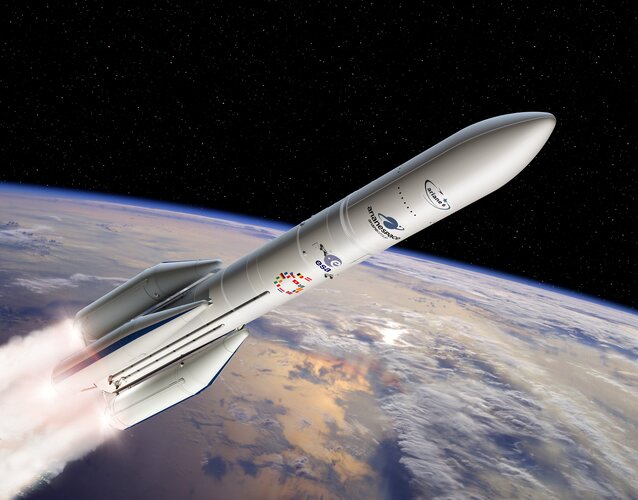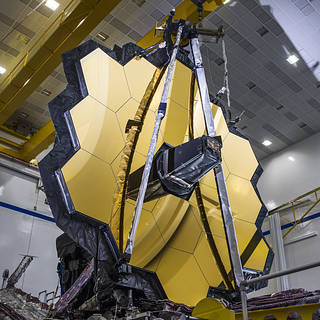
Copernical Team
Solar storm knocks out 40 SpaceX Starlink satellites
 A solar storm has knocked out 40 of 49 SpaceX Starlink broadband communications satellites the company launched on Thursday, the company said.
While the loss of dozens of spacecraft is likely a multimillion-dollar blow to SpaceX, the Starlink business plan will survive and the satellites do not pose a risk to Earth as they fall back and burn up in the atmosphere, Harvard astrophysicist
A solar storm has knocked out 40 of 49 SpaceX Starlink broadband communications satellites the company launched on Thursday, the company said.
While the loss of dozens of spacecraft is likely a multimillion-dollar blow to SpaceX, the Starlink business plan will survive and the satellites do not pose a risk to Earth as they fall back and burn up in the atmosphere, Harvard astrophysicist SpaceX Starship orbital flight likely this year
 SpaceX founder and CEO Elon Musk gave an update plans for the company's Starship rocket on Thursday night in South Texas, as the company prepares for the rocket's first orbital test flight, saying it would fly sometime this year - a less ambitious time frame than he'd previously offered.
SpaceX has not yet received approval from the Federal Aviation Administration to launch orbital fli
SpaceX founder and CEO Elon Musk gave an update plans for the company's Starship rocket on Thursday night in South Texas, as the company prepares for the rocket's first orbital test flight, saying it would fly sometime this year - a less ambitious time frame than he'd previously offered.
SpaceX has not yet received approval from the Federal Aviation Administration to launch orbital fli Spire Global completes acquisition of exactEarth
 Spire, a leading provider of space-based data, analytics and space services, has successfully completed its previously announced acquisition of exactEarth Ltd., a leading provider of global maritime vessel data for ship tracking and maritime situational awareness solutions, by way of a plan of arrangement, following the completion of all closing conditions.
The Arrangement, which was annou
Spire, a leading provider of space-based data, analytics and space services, has successfully completed its previously announced acquisition of exactEarth Ltd., a leading provider of global maritime vessel data for ship tracking and maritime situational awareness solutions, by way of a plan of arrangement, following the completion of all closing conditions.
The Arrangement, which was annou Musk 'confident' of Starship orbital launch this year
 Elon Musk delivered updates on SpaceX's efforts to develop its interplanetary Starship rocket on Thursday night, but stopped short of announcing a firm launch date for an orbital test or new missions, despite considerable buildup ahead of the rare presentation.
Addressing an audience at the company's Starbase facility near Boca Chica, south Texas, the tycoon merely said: "I feel at this poi
Elon Musk delivered updates on SpaceX's efforts to develop its interplanetary Starship rocket on Thursday night, but stopped short of announcing a firm launch date for an orbital test or new missions, despite considerable buildup ahead of the rare presentation.
Addressing an audience at the company's Starbase facility near Boca Chica, south Texas, the tycoon merely said: "I feel at this poi Astra Space stock plunges after rocket failure during NASA launch
 California-based Astra Space suffered a rocket failure during launch of a NASA mission from Florida on Thursday after two previous delays.
The company's stock plunged by more than 32% to $3.59 following the launch failure, but recovered a portion of that loss in subsequent trades. The plunge prompted a brief trading halt by the Nasdaq.
NASA's Launch Services Program, which had hi
California-based Astra Space suffered a rocket failure during launch of a NASA mission from Florida on Thursday after two previous delays.
The company's stock plunged by more than 32% to $3.59 following the launch failure, but recovered a portion of that loss in subsequent trades. The plunge prompted a brief trading halt by the Nasdaq.
NASA's Launch Services Program, which had hi Earth from Space: Hereford, Texas

Hereford, and its surrounding colourful patchwork of agricultural fields, is featured in this Copernicus Sentinel-2 image.
The devil’s in the detail
 Image:
The devil’s in the detail
Image:
The devil’s in the detail ESA selects payloads for Ariane 6 first flight

ESA in close collaboration with ArianeGroup and Arianespace has selected payloads which best fit the profile of the first mission of its new generation Ariane 6 launch vehicle from Europe’s Spaceport in French Guiana.
Musk to give rare presentation on ambitious Starship rocket

Billionaire entrepreneur Elon Musk is set Thursday night to deliver an eagerly-awaited update on SpaceX's Starship, a prototype rocket the company is developing for crewed interplanetary exploration.
The tycoon will make his presentation at SpaceX's Starbase facility near Boca Chica, south Texas, at 8:00 pm local time (0200 GMT Friday), against the impressive backdrop of the spacecraft in its fully-stacked configuration, standing 394 feet (120 meters) tall.
It will be Musk's first detailed progress report since 2019—though he often provides small updates on Twitter—and is expected be live-streamed on the company's website.
NASA to Discuss Webb Telescope Progress, Mirror Alignment
 NASA will hold a media teleconference at 11 a.m. EST on Friday, Feb. 11, to share progress made in the early stages of aligning the James Webb Space Telescope’s mirrors.
NASA will hold a media teleconference at 11 a.m. EST on Friday, Feb. 11, to share progress made in the early stages of aligning the James Webb Space Telescope’s mirrors. 































